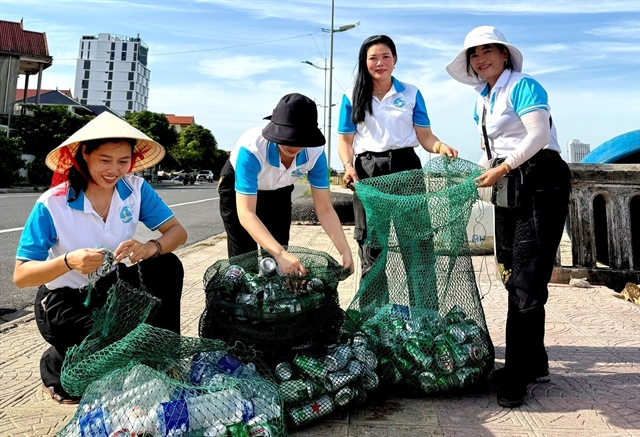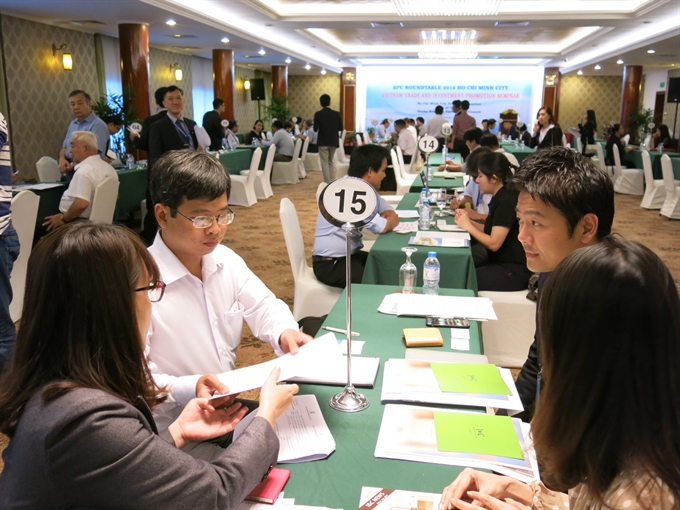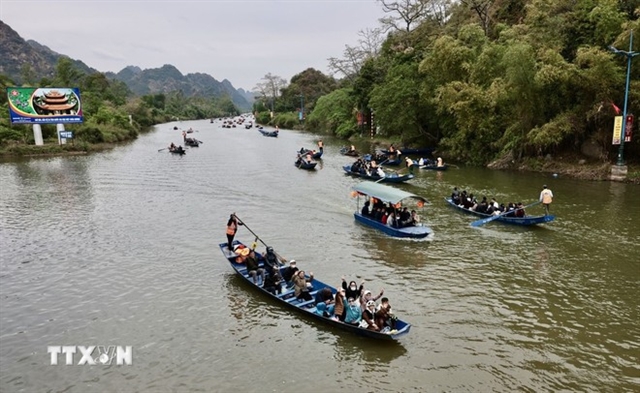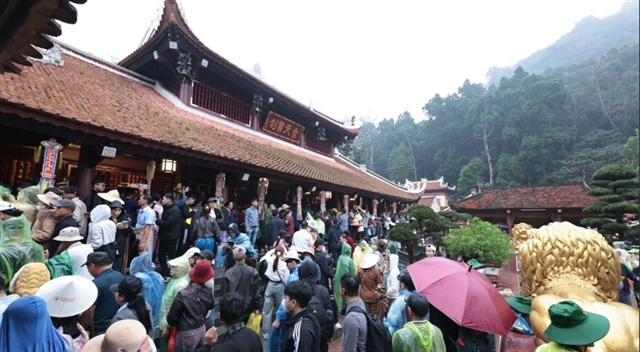 Economy
Economy

Phạm Thiết Hòa, director of HCM City’s Investment and Trade Promotion Centre, said the city was creating the best conditions to attract more investors by developing a clean land fund, improving the quality of infrastructure, and expanding the number of industrial parks and export processing zones.
 |
| Executives of Vietnamese firms exchange information with their foreign counterparts at a business-to-business meeting in HCM City yesterday. — VNS Photo Xuân Hương |
HCM CITY — Phạm Thiết Hòa, director of HCM City’s Investment and Trade Promotion Centre, said the city was working to create the best conditions to attract more investors by developing a clean land fund, improving the quality of infrastructure, and expanding the number of industrial parks and export processing zones.
Speaking at an investment seminar yesterday in the city, Hòa said investment priority would be given to nine key sectors: transport (warehousing, port services, maritime logistics and import/export); finance (banking, insurance, credit); postal, telecommunications and IT; real estate; consulting services and science-technology; travel; medical services; commerce; and education and training.
Sectors with high-tech content and high added value, such as mechanical engineering, electronics/IT, chemicals/rubber and food processing, will also be given more emphasis.
Other areas the city plans to give priority to include the biotech industry, clean technology, energy savings, and the fashion and design industries.
Preferential policies will be created to attract investors to the Thủ Thiêm New Urban Area, Hiệp Phước Port Urban Area, Bình Quới-Thanh Đa Urban Area, and urban railway lines.
Phạm Quốc Trung, a representative of the Management Authority for Urban Railways, said the city had 11 railway line projects, including metro, tramway and monorail lines, with total length of 229 kilometres.
Funds are needed for Metro Line No 2 (phase 2), Metro lines No3a and 3b, Metro lines No 4 and 4b, tramway No 1, monorail No 2 and monorail No 3.
Lê Bích Loan, deputy head of the Saigon Hi-Tech Park’s management board, said that all of the 300ha under the park’s first phase had been leased, and the second phase of 613ha was now under construction.
The park’s investment priorities are in the fields of microelectronics, semiconductors and ICT; precision mechanics and automation; biotechnology applied to pharmaceuticals and the environment, new and advanced materials and energy; and nanotechnology.
Preferential treatment for investors includes lower corporate income taxes for 15 years, and import duties and VAT exemption for imported goods.
Lâm Nguyễn Hải Long, director of Quang Trung Software City, the country’s first and largest software park, said that new QTSC branches were being planned. These would connect HCM City to other provinces and contribute to the development of Việt Nam’s economy and the IT industry.
The QTSC 2 project is slated to begin in 2017 with a total area of 250ha and total investment of US$1 billion. Key investors would be sought for a new data centre, and R&D and utility services.
Representatives from the city’s Health Department also called for investment in Củ Chi General Hospital, Hóc Môn General Hospital, Orthopedic Hospital, Cancer Hospital’s second facility in District 9, Tân Kiên-Bình Chánh Hospital cluster projects and a pediatric hospital, among others.
The seminar was part of the Business Partner City (BPC) Conference 2016, with representatives attending from 14 partner cities, including Hong Kong, Singapore, Bangkok, Kuala Lumpur, Manila, Jakarta, Seoul, Melbourne, Auckland, Shanghai, Tianjin and Osaka.
Masayuki Inoue, director general of Osaka’s Economic Strategy Bureau, said by exchanging information, BPC partner cities would have more opportunities to develop trade and investment.
The Business Partner City network helps promote business interaction within the Asia–Pacific region, contributing to economic development of each member city.
Business matching was organised in HCM City yesterday, where executives of more than 100 city-based businesses met with 28 counterparts from Japan, the Philippines and Australia in the trading, manufacturing and services sectors.
HCM City has 6,268 FDI projects, with total investment capital of $40.8 billion.
Singapore is the city’s largest FDI investor, followed by Malaysia, British Virgin Islands, South Korea and Hong Kong. — VNS




